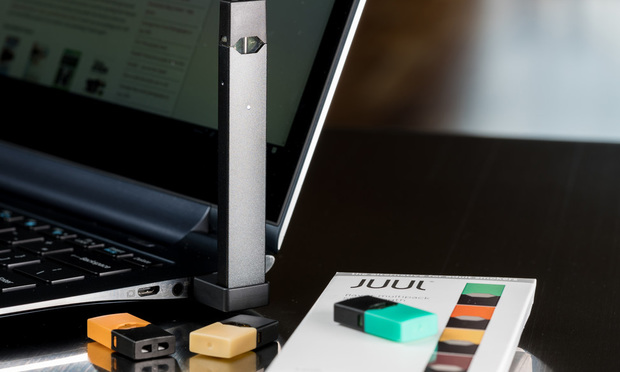Litigators' E-Cigarette Campaign Pays Off: 100 Calls in 3 Weeks
Connecticut-based Carter Mario Law Firm is known for its marketing and advertising and recently went all-out in an effort to reach e-cigarette users. The law firm advertised not just on television but on several social media platforms.
November 07, 2019 at 06:07 PM
4 minute read
 Juul e-cigarette or nicotine vapor dispenser being charged, with box and Juul pods on table. Photo: Steve Heap/Shutterstock.com
Juul e-cigarette or nicotine vapor dispenser being charged, with box and Juul pods on table. Photo: Steve Heap/Shutterstock.com
Hundreds of potential Connecticut litigants want to "Get Carter" to bring suits over electronic cigarettes in what experts say is a sign of an emerging litigation trend.
The uptick is evident at the Carter Mario Law Firm, whose marketing tag line is "Get Carter." The firm has focused on personal injury and defective product claims, but is now honing its marketing efforts on e-cigarette litigation.
"We've had close to 100 people, if not more, contact us from the ads they saw," said senior litigation attorney Ryan Veilleux.
The Carter Mario Law Firm has long had marketing efforts in the Nutmeg State. Its advertising appeared on television and radio in the 1990s, targeting personal-injury business. But its most recent and ambitious endeavor is a campaign to represent e-cigarette users who claim harm from the product.
The attorneys appear to have picked up on a litigation trend emerging across the country: suits and statewide probes alleging e-cigarettes are dangerous, especially to teenagers. To reach young litigants, they've taken the marketing campaign to social media, and have online advertisements, blog postings and Facebook pages.
The Carter Mario Law Firm has stayed true to what has always worked for it: television. The firm has been airing between 10 and 15 advertisements per day on local television in the past three weeks. The response has been more than anyone at the firm expected, litigator Veilleux said.
Veilleux is one of four attorneys who will be working on e-cigarette cases for the firm, which is also collaborating with other attorneys throughout the country.
"We've certainly conducted a lot of research on this topic. It's all new, but we certainly have a head start over everyone else in the state," he said. "I'm not aware of anyone else in Connecticut who is actively investigating claims right now."
Among the potential targets of these potential suits: San Francisco-based Juul Labs, which is fighting litigation accusing it of marketing to underage users. The legal age to use a Juul product is 21.
Juul was founded in 2017 as an arm of cigarette manufacturer Atria Group Inc., and its subsidiary, Phillip Morris USA Inc. It faces mounting litigation with suits in Connecticut, Florida, Illinois and elsewhere in the country.
No one from Juul's media relations department responded to a request for comment Thursday.
Meanwhile, some court watchers believe e-cigarettes litigation will soon be as common as lawsuits over tobacco products.
"They [Juul officials] are marketing the hell out of this product and, instead of selling them to smokers trying to quit, it turns out most of the e-cigarettes were sold to kids," said Mark Dubois, visiting assistant clinical professor of law at the University of Connecticut School of Law. "Their marketing is geared toward kids."
Dubois, an attorney with New London-based Geraghty & Bonnano, said the e-cigarettes, particularly Juul products, do "not have warnings on them that nicotine is addictive, because the [Food and Drug Administration] gave them a chance to figure out the technology first, but allowed them to market the product without the warning and without medical studies.
"Essentially, I can imagine an argument by an attorney that what this company was doing was, instead of testing on monkeys and rats, they tested on teens," Dubois said. "I can see the arguments, and I can see a lot of litigation."
And what about the Carter Mario Law Firm's strong marketing push in an profession with strict advertising rules?
Dubois sees no immediate missteps. Connecticut's former top attorney disciplinarian and co-author of "Connecticut Legal Ethics and Malpractice" sees no ethical problems related to efforts from the firm or its founder, Carter Mario.
"Carter Mario is a good attorney," Dubois said. "He knows where the lines are, and he won't cross them. He helped write the rules for lawyer advertising."
Related stories:
Legal Fight Heats Up Over Vaping With First CT Fatality
FTC Opens Probe Into E-Cigarette Marketing, Demands Information From 6 Manufacturers
This content has been archived. It is available through our partners, LexisNexis® and Bloomberg Law.
To view this content, please continue to their sites.
Not a Lexis Subscriber?
Subscribe Now
Not a Bloomberg Law Subscriber?
Subscribe Now
NOT FOR REPRINT
© 2025 ALM Global, LLC, All Rights Reserved. Request academic re-use from www.copyright.com. All other uses, submit a request to [email protected]. For more information visit Asset & Logo Licensing.
You Might Like
View All
Preparing for Change? These Leaders Have Already Done It. Plus, Managing Partner Survey Results
8 minute read

Big Law Practice Leaders Gearing Up for State AG Litigation Under Trump
4 minute read
Lawyers Share Concerns, Predictions Over How Bondi’s Loyalism to Trump May Impact DOJ
6 minute readTrending Stories
- 1South Florida Attorney Charged With Aggravated Battery After Incident in Prime Rib Line
- 2'A Death Sentence for TikTok'?: Litigators and Experts Weigh Impact of Potential Ban on Creators and Data Privacy
- 3Bribery Case Against Former Lt. Gov. Brian Benjamin Is Dropped
- 4‘Extremely Disturbing’: AI Firms Face Class Action by ‘Taskers’ Exposed to Traumatic Content
- 5State Appeals Court Revives BraunHagey Lawsuit Alleging $4.2M Unlawful Wire to China
Who Got The Work
J. Brugh Lower of Gibbons has entered an appearance for industrial equipment supplier Devco Corporation in a pending trademark infringement lawsuit. The suit, accusing the defendant of selling knock-off Graco products, was filed Dec. 18 in New Jersey District Court by Rivkin Radler on behalf of Graco Inc. and Graco Minnesota. The case, assigned to U.S. District Judge Zahid N. Quraishi, is 3:24-cv-11294, Graco Inc. et al v. Devco Corporation.
Who Got The Work
Rebecca Maller-Stein and Kent A. Yalowitz of Arnold & Porter Kaye Scholer have entered their appearances for Hanaco Venture Capital and its executives, Lior Prosor and David Frankel, in a pending securities lawsuit. The action, filed on Dec. 24 in New York Southern District Court by Zell, Aron & Co. on behalf of Goldeneye Advisors, accuses the defendants of negligently and fraudulently managing the plaintiff's $1 million investment. The case, assigned to U.S. District Judge Vernon S. Broderick, is 1:24-cv-09918, Goldeneye Advisors, LLC v. Hanaco Venture Capital, Ltd. et al.
Who Got The Work
Attorneys from A&O Shearman has stepped in as defense counsel for Toronto-Dominion Bank and other defendants in a pending securities class action. The suit, filed Dec. 11 in New York Southern District Court by Bleichmar Fonti & Auld, accuses the defendants of concealing the bank's 'pervasive' deficiencies in regards to its compliance with the Bank Secrecy Act and the quality of its anti-money laundering controls. The case, assigned to U.S. District Judge Arun Subramanian, is 1:24-cv-09445, Gonzalez v. The Toronto-Dominion Bank et al.
Who Got The Work
Crown Castle International, a Pennsylvania company providing shared communications infrastructure, has turned to Luke D. Wolf of Gordon Rees Scully Mansukhani to fend off a pending breach-of-contract lawsuit. The court action, filed Nov. 25 in Michigan Eastern District Court by Hooper Hathaway PC on behalf of The Town Residences LLC, accuses Crown Castle of failing to transfer approximately $30,000 in utility payments from T-Mobile in breach of a roof-top lease and assignment agreement. The case, assigned to U.S. District Judge Susan K. Declercq, is 2:24-cv-13131, The Town Residences LLC v. T-Mobile US, Inc. et al.
Who Got The Work
Wilfred P. Coronato and Daniel M. Schwartz of McCarter & English have stepped in as defense counsel to Electrolux Home Products Inc. in a pending product liability lawsuit. The court action, filed Nov. 26 in New York Eastern District Court by Poulos Lopiccolo PC and Nagel Rice LLP on behalf of David Stern, alleges that the defendant's refrigerators’ drawers and shelving repeatedly break and fall apart within months after purchase. The case, assigned to U.S. District Judge Joan M. Azrack, is 2:24-cv-08204, Stern v. Electrolux Home Products, Inc.
Featured Firms
Law Offices of Gary Martin Hays & Associates, P.C.
(470) 294-1674
Law Offices of Mark E. Salomone
(857) 444-6468
Smith & Hassler
(713) 739-1250










